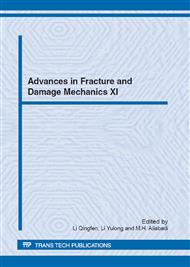p.153
p.157
p.161
p.165
p.169
p.173
p.177
p.181
p.185
Fatigue Behavior of A356 Cast Aluminum Alloy Microstructurally Modified by Friction Stir Processing under Low Strain Rate Condition
Abstract:
The fatigue behavior of cast aluminum alloy, A356-T6, microstructurally modified by the friction stir processing (FSP) was investigated. The FSP conditions were set to be the tool rotational speed of 500 rpm and traveling speed of 200 mm/min, in which the strain rate was relatively low. Plane bending fatigue tests have been performed using the as-cast and friction stir processed (FSPed) specimens. Fatigue strengths in the finite life region and the fatigue limit of the FSPed specimens were highly improved compared with the as-cast ones resulting from the elimination of casting defects by the FSP. However, the crack growth rates of the FSPed specimens were faster than those of the as-cast ones due to the softening of the material by heat input during the FSP. The effects of FSP with low stain rate were discussed based on the microstructural consideration.
Info:
Periodical:
Pages:
169-172
Citation:
Online since:
November 2012
Authors:
Price:
Сopyright:
© 2013 Trans Tech Publications Ltd. All Rights Reserved
Share:
Citation:


